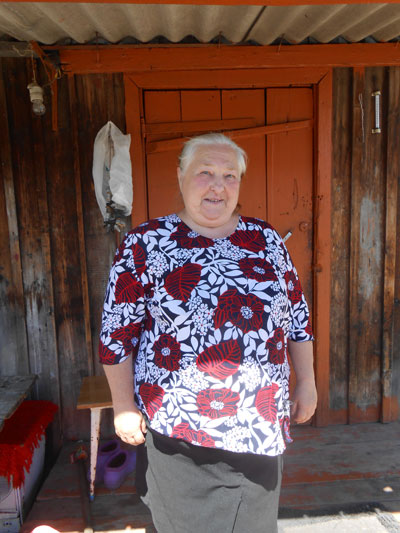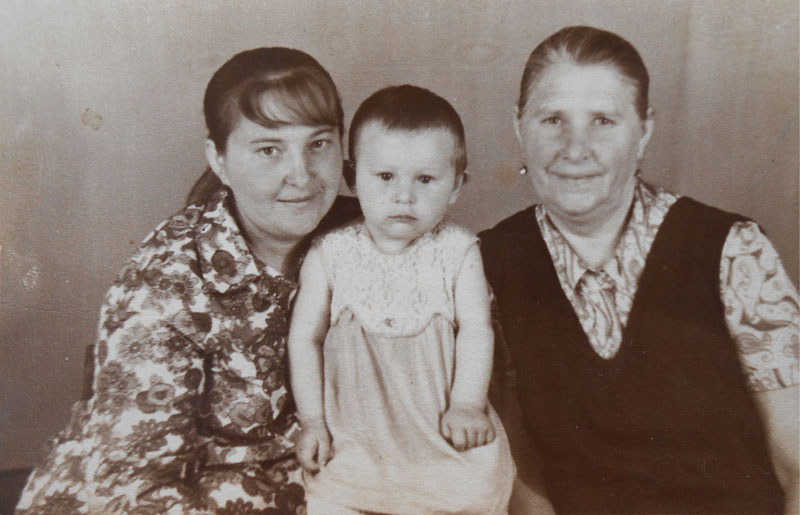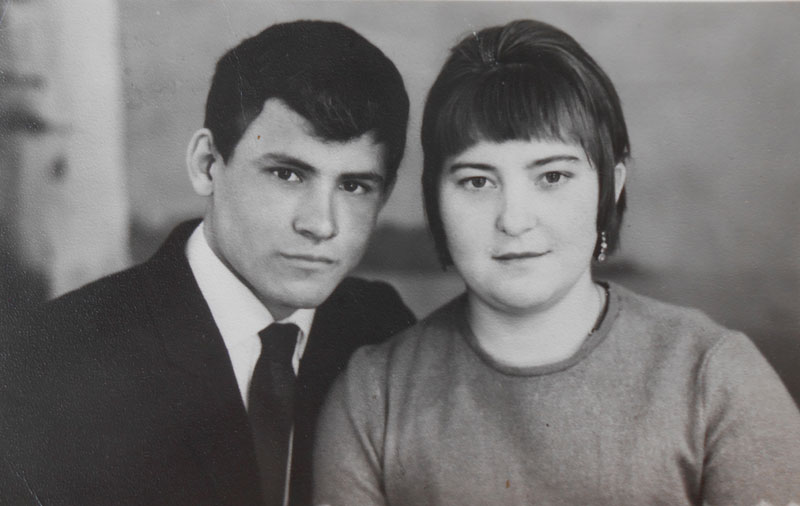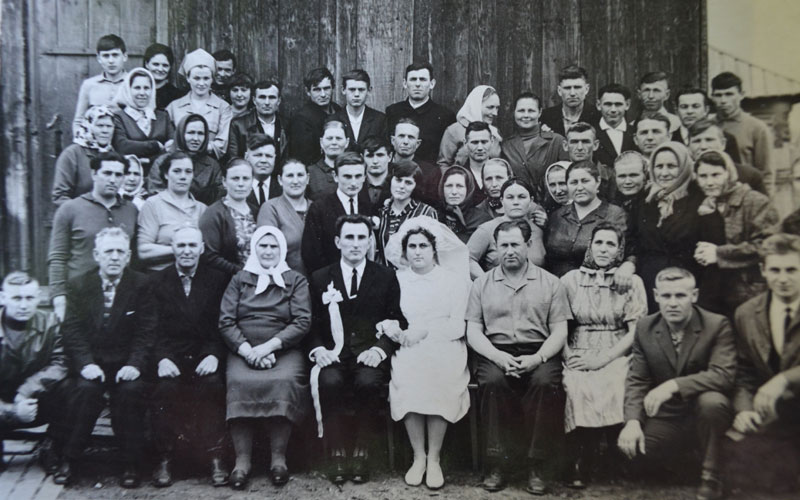









 Rosa Danilovna received us on a warm morning of July at the threshold of her
house in the village of Sagaiskoe, District of Karatus. She told us her story in
a very emotional and interesting way.
Rosa Danilovna received us on a warm morning of July at the threshold of her
house in the village of Sagaiskoe, District of Karatus. She told us her story in
a very emotional and interesting way.
In the autumn of 1941 the Schwabenland family (maiden name of our interview partner) was resettled from the Autonomous Republic of the Volga-Germans. Father Daniel Augustovich (born 1908), mother Kristina Augustowna (born 1914, maiden name Schmidt), Daniel‘s mother Yekaterina Feliksovna (born 1918) as well as two of their little sons: Daniel (born 1931) and August (born 1939) were sent to Siberia. In January 1942 another son called Andrei saw the light of day. According to what her mother told, the members of the family were very industrious (the mother worked for the kolkhoz farm, the father was a tractor driver). Before their forced resettlement they did not lead a bad life: on the Volga they had lived in their own house, there were three cows, a big orchard – but they had to leave everything behind. They were given only little time to pack some belongings. All they were able to take a long in the end were “a suitcase, the two children – and that was it.
Many villagers who had previously lived in the ASSR of the Volga-Germans got to the District of Karatus. Admittedly, they were spread over different villages, regardless of their family relationship: the mother’s sister was sent to the village of Cherepanovka, the Schwabenlands and three more German families got to Sagaiskoe. Rosa Danilovnas parents were alloted a little hut with just one single room.
The family had not even settled in in Sagaiskoe, when the father was mobilized to the labor army in winter 1942, where he spent eight years. After his return five more children were born to the Schwabenlands: Rosa, Yekaterina, Anna, Maria und Pavel. The head of the family talked little about where and how he worked during his stay in the labor army. Credibly known ist he fact that he was assigned to work in a pit – belowground: „They would allow you to come up fort wo hours and then – back to the mine shaft“. In Sagaiskoe the whole burden of a head of family rested on the shoulders of Kristina Augustowna, who had to pull through three sons and her husband’s mother. Mother Rosa Danilovna worked for the kolkhoz farm and took are of the household when she returned from work. The eldest son Daniil (he was about 12 years old) worked in a horse stable, one of his tasks was to drive the forewoman around. As his mother said, he was already able to earn his little piece of bread“. He should have gone to school in Siberia, but things turned out quite differently. The relatives who had been scattered all over Karatus District tried their best to help and support each other, although they had to walk more than a dozen kilometers on foot. In the 1940s and early 1950s Rosa Danilovna‘s parents, as well as the other Germans, were compelled to get registered at the Commandant’s office once a month.
After the father had returned home, he worked for the local blacksmith’s shop and as a tractor driver. The mother was working all her life: after the war in some chicken house, later as a kindergarten teacher.
Among themselves, within the family, the Schwabenland’s spoke only German. “They did not understand Russian at all”. This complicated the adaptation process to Siberia during the first time considerably. „Go and work, they would say; but they did not understand, which task they were supposed to fulfill”. „They laughed about us“, - said the mother, although she did not like to recall this difficult period of her life. By and by they learned a little Russian. At home, however, they used to continue using their mother tongue: „I was often scolded, –Rosa Danilovna admits, because I gave an answer in Russian“. The children already born in Siberia adopted Russian as colloquial language, but they could not or did not want to talk in German.
Kristina Augustovna was Lutheran, and she remained faithful to this confession in Siberia, as well. As other German women, who had happened to get to the hamlet of Sagaiskoe, she went to unofficial meetings on Sundays, where the German women sang their songs.
Rosa Danilovna went to school in Sagaiskoe. During the holidays she always used to work. „Mother harvested tobacco leaves for the production of makhorka and we processed it; I transported water to the fields for the brigades“. Having finished the 8th grade, she found a job for the kolkhoz farm as a milkmaid, for her father had told her: „First of all you ought to earn a little money, afterwards you can get an education“. Later she went to attend the school for bookkeepers and accountants in Minussinsk, before she graduated from Achinsk technical school. In the following she worked 44 years „for the native kolkhoz farm. She never left the place”. In 1971 Rosa Danilovna got married to a German fellow called Alexander Eisner, whose family, just as Rosa‘s, had been expelled from the Volga Region in autumn 1941. Two children were born to Rosa Danilovna and Alexander Friedrichovich: a daughter and a son. Rosa Danilovna‘s brothers and sisters married Russian men or Russian women. And the children of our interview partner live inmixed marriages. Meanwhile she has four grand-children, which she is very proud of.
In her younger days Rosa Danilovna, being the secretary of the komsomol organization, was socially very active. Later she became a member of the party. „I still believe in the party today, and I think that we had a better life at that time – let it have been, as it was”. Her relatives (particularly her father) did not approve the activities of her daughter. But she would always play a part in party activities– even against the opinion of her parents.
The children of Kristina and Daniel Schwabenland grew up. All of them stayed in the District of Karatus, except for one of the daughters, who moved to the Far East.
Her father’s health was destroyed by the labor army. He died in 1965, although he was not an old man at that time. After the death of her husband, several local men asked for her hand in marriage, but she did not marry again. In spite of her difficult life she got 92 years old. According to German tradition and the legacy of her mother, German women held the requiem and sang religious songs. „They were singing all evening and came over once again the following morning“. Certainly, she remarked, life under the Russians showed its effects: however mother asked to also keep the Russian customs, i.e. to remember the dead on the 9th and 40th days, as well as exactly after a half year, even though this is no common practice among the Germans. Rosa Danilovna talks about her mother with great thankfulness: „She had a hard, but she managed to grow up eight children”.
The wish to return to the native Volga Region never came up with her family. Already at post-Soviet times Rosa Danilovna’s grandson performed his military service in the Saratov Region, and she asked him to visit the house of her parents on the Volga. In the 1990s, when they were talking about possible compensation payments to the forced resettlers for the property they had left behind, Rosa Danilovna tried to fill in the documents needed for the receipt of such recompense. However, she, as well as many other Germans, did not manage to obtain any money. After the collapse of the Soviet Union, Rosa Danilovna intended to make an application to emigrate to Germany. Many acquaintances left for Germany at that time, but her husband did not agree with her plans, so that she finally stayed in Sagaiskoe.
Rosa Danilovna recalls that the children at school, in the late 1950s, used to abuse her, calling her a „Fascist“, a „German“. She has the opinion that even nowadays people show prejudice towards the former victims of repressions, although many, many years have passed since then. The Germans, after all, take no blame that they were expelled. “Why were they deported, what did they do that for?” „They were suffering want and agonies for nothing at all. And how were they treated? They were treated as if they were dogs. They were forced to do the dirtiest work“. Of course, in the course of time, relations turned out to be alright. „And there were always friends - people used to visit each other“. This, in various respects, is the results of Kristina Augustovna’s efforts, who managed to engage the people’s sympathies and who was a very pleasant and approachable person herself. Step by step they settled in…
Rosa Danilovna has been on pension for a long time, but she feels very concerned about what happens in her home village. „At that time there was a very sane kolkhoz farm, but now everything completely decayed“. „We have already sent a letter to the regional governor, but there has been no answer so far“. She has no intentions to leave for Germany.
The interview was taken by Yelena Sberovskaya and Marina Konstantinova.

Rosa with her daughter and mother

Rosa Danilovna with her husband Alexander Friedrichovich in the early 1960s

German wedding in Sagaiskoe in the 1950s
Expedition of the V.P. Astafev State Pedagogic University Krasnoyarsk and the Krasnoyarsk „Memorial“-Organization on the project „Anthropologic turn in social-humanitarian sciences: Methodology of field research and practical experience in the realization of narrative interviews“ - (Sponsored by the Mikhail-Prokhorov Foundation).